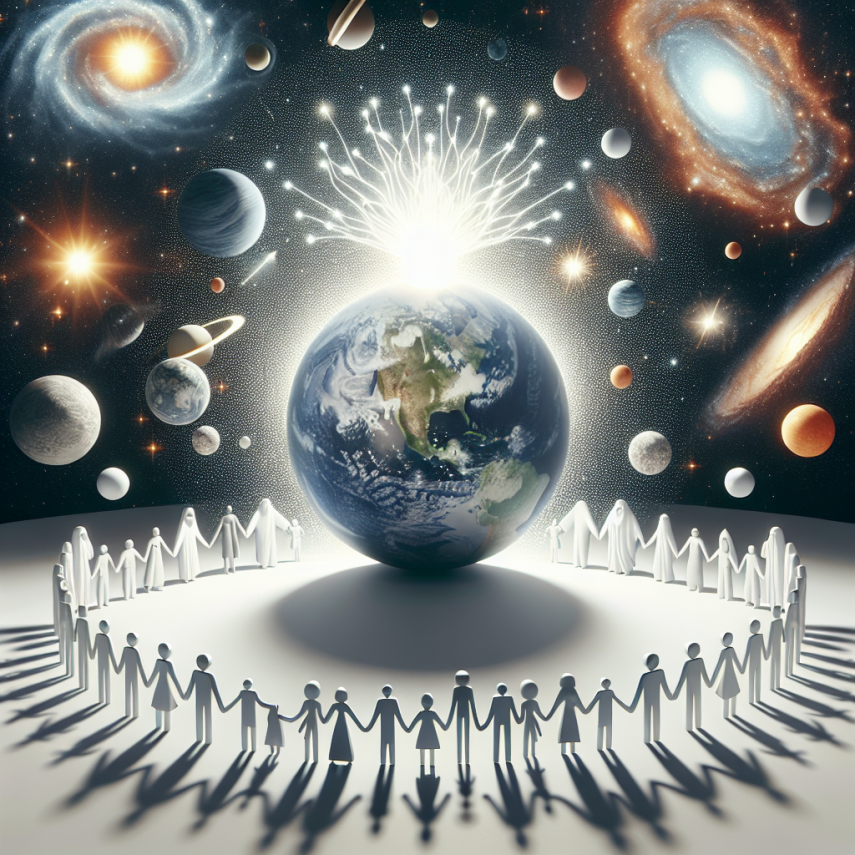“`html
The Creation Story: Illuminating Our Understanding of Faith and Existence
The Creation Story, a cornerstone of the biblical narrative, holds profound significance in shaping our understanding of God, humanity, and the universe. As a believer exploring the intersection of faith and reason, I find this topic particularly resonant. It serves as a foundation for many theological and moral principles that guide Christian life. In this article, we will delve into the historical context, key themes, and contemporary relevance of the Creation Story, offering insights and reflections from both scriptural and personal perspectives.
The Significance of the Creation Story
The Creation Story, located in the opening chapters of the Book of Genesis, presents a divine narrative of how the universe and all life within it came into being. The story is not just an account of origins but a declaration of God’s supreme power, wisdom, and intentionality. As Genesis 1:1 states, “In the beginning, God created the heavens and the earth,” setting the stage for a series of creative acts that culminate in the formation of humankind.
Historical and Cultural Context
In the ancient Near Eastern context, creation myths were prevalent among various cultures. However, the Biblical Creation Story stands distinct in its monotheistic perspective. It asserts one sovereign God, contrasting with the polytheistic narratives of neighboring civilizations. This unique aspect underscores the Hebrews’ theological conviction: a single, omnipotent Creator as the source of all existence, evoking a sense of divine order and purpose.

Key Themes and Scriptural References
The Creation Story introduces several key themes that are essential to Christian theology:
- Divine Sovereignty: God’s absolute authority and power over creation (Genesis 1:1-3).
- Goodness of Creation: Repeated affirmation of creation’s inherent goodness (Genesis 1:10, 12, 18, 21, 25, 31).
- Human Uniqueness and Purpose: Humanity created in the image of God with a unique role (Genesis 1:26-28).
Theological Implications
The Creation Story offers profound insights into the nature of God and our relationship with Him:
| Theme | Scriptural Reference | Theological Implication |
|---|---|---|
| God’s Power | Genesis 1:1-3 | Affirms belief in an omnipotent Creator, strengthening faith in God’s sovereignty. |
| Humanity’s Purpose | Genesis 1:26-28 | Highlights human stewardship and responsibility over creation, reflecting God’s image. |
| Creation’s Goodness | Genesis 1:31 | Encourages respect and care for the environment, recognizing it as God’s good creation. |

The Creation Story in Christian Traditions
Interpretations of the Creation Story vary across Christian traditions. Some hold to a literal understanding, viewing the days of creation as 24-hour periods. Others adopt a metaphorical or allegorical approach, seeing the days as symbolic of longer epochs of time aligning with scientific views on evolution and cosmology. Regardless of interpretation, the central message remains: God is the intentional and loving Creator of all.
Modern Relevance and Applications
The principles derived from the Creation Story are especially relevant to contemporary believers and societal issues:
- Environmental Stewardship: As stewards of God’s creation, we are called to care for the environment. This aligns with the growing Christian environmentalism movement, advocating for sustainable living and conservation.
- Human Dignity: Recognizing humanity’s creation in God’s image fosters respect for all individuals, encouraging social justice, equality, and compassion.
- Purpose and Meaning: The Creation Story offers a profound sense of purpose, guiding us to live in accordance with God’s will, enhancing both personal fulfillment and community well-being.

Personal Reflections
My journey through faith and doubt resonates deeply with the themes of the Creation Story. The narrative of a purposeful and good creation has provided solace and guidance during my moments of uncertainty and adversity. It reminds me of God’s sovereignty and the intentional design behind our existence. This perspective aligns with my professional endeavors in technology, where the intricacy of systems echoes the orderliness of God’s creation.
Furthermore, the mandate of stewardship and justice has inspired my commitment to ethical practices and advocacy for social causes. As highlighted in previous blog posts, such as “Discovering Strength through Christian Community and Fellowship” and “Embracing Your Divine Calling: A Christian Approach to Work and Vocation”, integrating faith into all aspects of life is crucial for holistic living.
Conclusion
The Creation Story is not merely an ancient myth but a dynamic, life-shaping narrative that informs our understanding of God, humanity, and the universe. It offers timeless lessons on divine power, human purpose, and the inherent goodness of creation. As we reflect on this profound story, let us strive to apply its principles in our personal and communal lives, embracing our role as stewards of creation and bearers of God’s image.
For further study, consider these questions:
- How does the Creation Story influence your understanding of God’s nature?
- In what ways can you practice better stewardship of God’s creation in your daily life?
- How can recognizing the image of God in others shape your interactions and relationships?
Reflecting on these questions can deepen your engagement with the Creation Story, enriching your faith and understanding of God’s profound narrative.
Focus Keyphrase: The Creation Story
“`




This article truly resonated with me. The connection between the Creation Story and modern themes like environmental stewardship and human dignity is impactful. As a single mother navigating life’s challenges, this piece reminded me of the divine purpose and care in every aspect of our lives. Thank you, David, for this inspiring read.
Thank you for reading this exploration of the Creation Story. I wrote this article to delve into the profound themes and insights that this foundational narrative offers, from theological implications to its relevance in modern life. My hope is that it inspires deeper reflection and engagement with your faith.